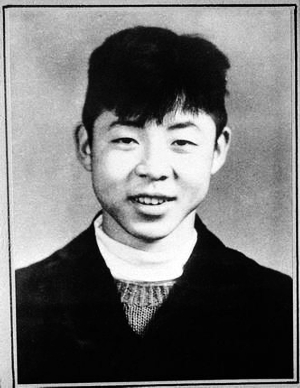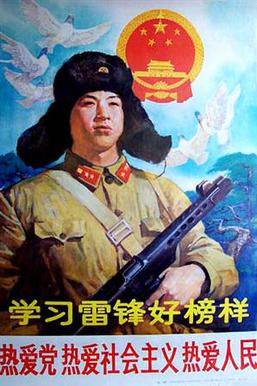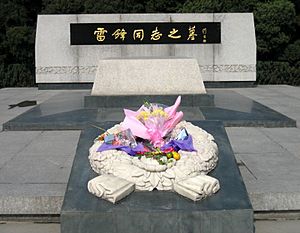Lei Feng facts for kids
Quick facts for kids
Lei Feng
|
|||||||||||
|---|---|---|---|---|---|---|---|---|---|---|---|
| 雷锋 | |||||||||||
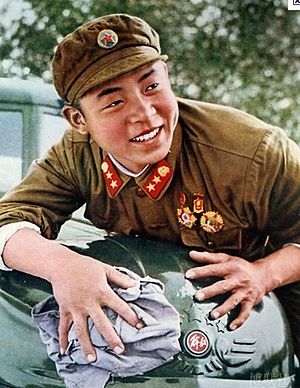 |
|||||||||||
| Born | 18 December 1940 Wangcheng, Hunan, China
|
||||||||||
| Died | 15 August 1962 (aged 21) Fushun, Liaoning, China
|
||||||||||
| Cause of death | Work accident | ||||||||||
| Occupation | Soldier | ||||||||||
| Political party | Chinese Communist | ||||||||||
| Chinese name | |||||||||||
| Simplified Chinese | 雷锋 | ||||||||||
| Traditional Chinese | 雷鋒 | ||||||||||
|
|||||||||||
Lei Feng (born December 18, 1940 – died August 15, 1962) was a soldier in the People's Liberation Army of China. He became famous after his death because of several big campaigns by the Chinese government. These campaigns encouraged people to "Follow the examples of Comrade Lei Feng."
Lei Feng was shown as a perfect citizen. People were told to be like him: selfless, humble, and very loyal to Mao Zedong, who was the leader of China at the time. Even after Mao died, Lei Feng was still promoted as a role model. You can still see his image on T-shirts and other items today.
Some parts of Lei Feng's life story, especially his diary, are believed by many to be part of the government's campaigns. Some people even question if Lei Feng himself was a real person. Because of this, some Chinese people feel a bit doubtful or even make fun of the ongoing use of Lei Feng in government messages. However, Lei Feng remains an important symbol in China, even after many political changes.
Lei Feng's Life Story
According to the official story from China, Lei Feng was born in Wangcheng. This area is now near a town called Leifeng, which was named after him. He lost his whole family before the People's Republic of China was formed. This meant he became an orphan.
His father died when Lei Feng was only five years old. His older brother, who worked very hard as a child, died a year later. His younger brother also passed away soon after that.
Lei Feng joined the Communist youth group when he was young. At age twenty, he joined the People's Liberation Army. He worked in a transportation unit. The official story says Lei Feng died in 1962 when he was 21. He was directing an army truck when it hit a telephone pole. The pole then fell and hit him.
Lei Feng's Public Image
Lei Feng was not widely known until after he died. In 1963, a book called Lei Feng's Diary was shared with the public. This was part of the first "Learn from Lei Feng" campaigns. The diary was said to be full of Lei Feng's admiration for Mao Zedong. It also described his selfless actions and his wish to help the revolution.
He famously said his only goal was "to be a rustless screw" for the revolutionary cause. Many experts believe that this diary was created by government officials to help the campaign.
The campaign started when China's economy was getting better after a difficult time. By 1964, the "Learn from Lei Feng" campaign began to focus more on praising Mao Zedong.
Chinese leaders have often praised Lei Feng as a symbol of selflessness. Leaders like Deng Xiaoping, Zhou Enlai, and Jiang Zemin have written about him. His importance is still promoted by Chinese media and government. They often highlight the importance of good moral character from Mao's time.
Lei Feng's story is still part of school lessons in China. The phrase huó Léi Fēng (meaning "living Lei Feng") is now used to describe anyone who is selfless or goes out of their way to help others.
The way the Chinese government made Lei Feng a famous soldier is special. It's different from how other countries create war heroes. In China, Lei Feng was part of a bigger effort to show soldiers as great role models. This also showed how the People's Liberation Army supported the Communist government.
Is the Story Real?
Some parts of Lei Feng's life story have been questioned. While a person named Lei Feng might have existed, many experts believe the person shown in the campaign was mostly made up. For example, the campaign showed twelve photos of Lei Feng doing good deeds. These photos were very professional. It seemed strange for an unknown young man to have such high-quality pictures of his everyday tasks.
Because of the very positive details in Lei Feng's official story, some Chinese people have become doubtful or even make fun of it. A journalist named John Fraser said that any Chinese person he talked to outside of official meetings would "snort" about Lei Feng.
A survey in 2008 found that many elementary school students didn't know much about Lei Feng's life. Only 32 percent of them had read his diary.
Lei Feng Today
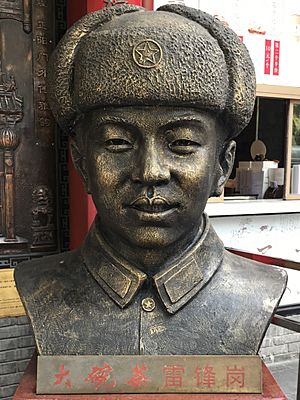
March 5th is now the official "Learn from Lei Feng Day" (Chinese: 学雷锋日; pinyin: Xué Léi Fēng Rì). On this day, schools and communities hold events. People go to clean up parks, schools, and other public places. Local news often shows these events.
Lei Feng is especially honored in Changsha, Hunan, and in Fushun, Liaoning. There is a Lei Feng Memorial Hall and a statue in his birthplace, which is now called Leifeng. The local hospital there is also named after him.
In Fushun, where Lei Feng's army unit was based and where he died, there is also a Lei Feng Memorial Hall and a museum. His tomb is on the memorial grounds. To remember him, Fushun has named several places after him, including Lei Feng Road, Lei Feng Elementary School, Lei Feng Middle School, and a bank office.
There is a common misunderstanding that Lei Feng was well known in the United States and honored at West Point. This idea came from an April Fools' Day article in 1981. A reporter from the Xinhua News Agency thought it was a real article. The reporter later corrected this mistake in 2015.
Lei Feng's story is still mentioned in popular culture. A popular song by singer Xue Cun is called "All Northeasterners are Living Lei Fengs." This song became very famous in 2001 when it was put with fun animations online. In March 2006, a Chinese group released an online game called Learn from Lei Feng Online. In the game, players do good deeds, fight spies, and collect parts of Mao Zedong's collection. If a player wins, they get to meet Chairman Mao in the game.
By the 2010s, interest in Lei Feng had become more about fun items like T-shirts and stickers. People were less interested in his life story or diary. Movies about his life, like Young Lei Feng and Lei Feng’s Smile, did not sell many tickets in some cities.
See also
 In Spanish: Lei Feng para niños
In Spanish: Lei Feng para niños
- Dong Cunrui
- Wang Jinxi
- Former Residence of Lei Feng
- List of campaigns of the Chinese Communist Party
- Zhang Side
- Pavlik Morozov
- Alexey Stakhanov
 | Charles R. Drew |
 | Benjamin Banneker |
 | Jane C. Wright |
 | Roger Arliner Young |


